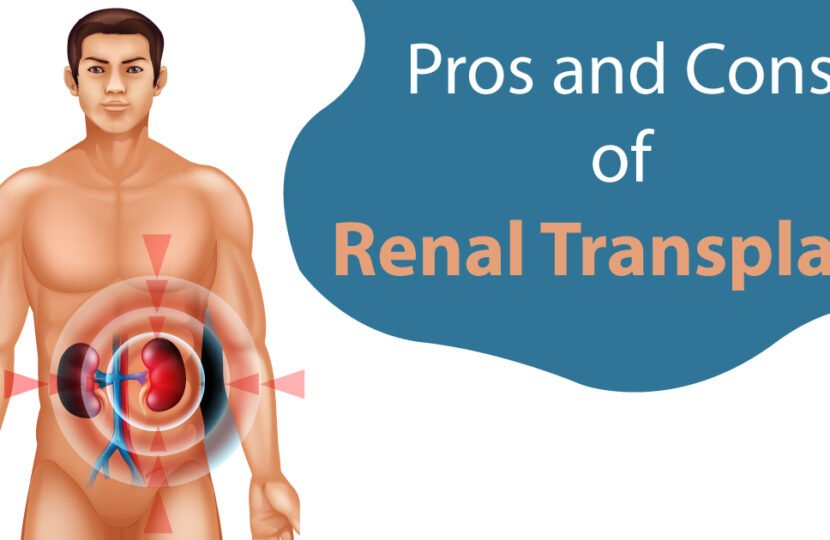Kidney transplants are one of the most common transplant surgeries done globally. In India alone, around 10,000 kidney transplants are done each year. The success rate for this surgery is around 90%.
What is a kidney transplant?
A surgery where the non-functioning kidney of a kidney patient is replaced with a healthy working kidney from a donor (alive or deceased)
Who might need a kidney transplant?
All patients who have an end-stage renal disease where the kidneys have given up more than 90% of their functionality are considered for a renal transplant. You should be healthy enough with no such underlying serious conditions which are not recommended for getting surgery.
Recommended in Patients with kidney failures caused by:
- Tumors of the kidney (such as Wilm’s tumor)
- A few kinds of Autoimmune diseases
- High blood pressure and hypertension
- Glomerulonephritis (inflammation of the filtering system of kidneys)
- Congenital kidney problems like Polycystic kidney disease (A genetic disorder. Causes fluid-filled cysts to develop and hinder normal kidney function leading to kidney failure eventually)
- Have advanced chronic kidney disease at stage IV or V with an estimated GFR lesser than 20 ml/min
- Have chronic kidney disease at stage IV with GFR less than 30 ml/min
- Have chronic kidney disease with type 1 diabetes that has failed to respond to medical treatment
Who may not be suitable for a kidney transplant?
A patient should be healthy enough to be considered a good candidate for a renal transplant.
A renal transplant is considered dangerous if you have underlying conditions such as:
- Cancer, or a family history of cancer
- Infections such as tuberculosis, hepatitis, or bone marrow infection
- Severe cardiovascular diseases
- You smoke or drink excessively
- Have a life expectancy below 5 years of age
- Inability to stick to a medication routine as prescribed by your doctor.
This evaluation is done through several visits to your doctor. Our Kidney transplant physician in Ahmedabad will assess your mental, physical, and familial condition, run tests on your blood and urine and set you up with a social worker to make sure you are mentally prepared for surgery.
Advantages of Kidney Transplant
- Better quality of life – having cleaner filtered blood, with all levels of salt and electrolytes normal lead to a healthier mind and body without having to be on constant medicines or visit hospitals all the time.
- More control over daily activities – Your schedule stops revolving around dialysis appointments. You stop running into the risks of giving up certain plans and activities due to dialysis schedules.
- Lower risk of death – thanks to a healthy kidney, your chances of survival increase to 15-20 years on a live donor and 10-15 years on a deceased donor kidney transplant
- Fewer dietary restrictions – With a working kidney, diet restrictions are reduced and normal eating habits are possible. Fluid intake can also be maintained at normal now.
- Fewer hypertension medications are required for high blood pressure
- Treatment costs are reduced as long-term dialysis appointments are no longer required. The only recurring cost will be immunosuppressive medications.
Risks of Kidney Transplant
- Although getting a kidney transplant is better than being on dialysis long-term, it is advisable that you talk to our transplant physician to understand all the risks associated with it and if you are a suitable candidate for receiving a transplant.
- The number of recipients outnumbers donors – Live kidney donors are preferred over cadaver kidneys (from dead bodies whose organs have been preserved for donation). However, the demand exceeds the supply and it may be long before a recipient awaiting a transplant gets a suitable kidney donor to go ahead with.
- Health insurance to cover costs – Not having an adequate health insurance plan might not make you a suitable candidate in a lot of countries, although not in India currently. This is made necessary there to cover the high cost of medications and surgery.
- Surgery-associated risks – the rarest risk is death, but it cannot be ruled out in certain cases, with any surgery. Apart from that the more common risks include developing blood clots, blood infections, heart attacks, vessel blockage, blockage in the ureter, etc
- Lifelong anti-rejection medications – The human body is unable to recognize the transplanted kidney as its own organ and will always treat it as a foreign body. To prevent the body from attacking its own self, renal transplant patients are put on a course of immune-suppressing medication s lifelong, which cannot be missed, or else kidney damage may occur due to an immune attack.
- A side effect of medications – since lifelong medications are a part and parcel of life, there is always a possibility that certain patients may react negatively to them, such as triggering cancer or diabetes. Lowered immunity due to immune suppression also means a general increase in the risk of other infections.
In addition to this, there can be a lot of considerations one might have before getting a kidney transplant. We at Alfa Kidney Care Ahmedabad can help you address those concerns and provide the best medical guidance and care possible pre and post-surgery.
Consult our transplant physician and put your mind and kidney at ease. We have trustworthy medical professionals who have worked with kidney disease patients and recognize the fact that each patient is different and needs different monitoring.


